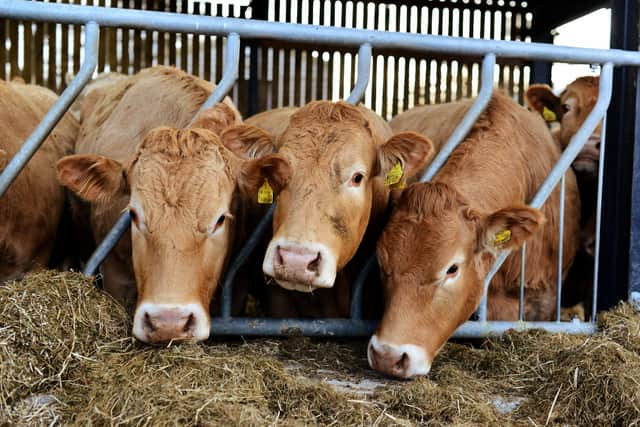Government to back small abattoir businesses at risk of being wiped out by 2030
It is going to introduce funding that will promote enhanced productivity, innovation and improved animal health and welfare.
The announcement was made by farming minister, Mark Spencer, at the NFU Conference last week.
Advertisement
Hide AdAdvertisement
Hide AdHe said: “If farming is to flourish then we need to get the fundamentals right - abattoirs are key to the food supply chain and there is clearly a need to support smaller providers in this area.


“The availability of funding will help abattoirs to invest in new technology and improve productivity and animal health and welfare, allowing our agriculture sector to get its high-quality produce to market.”
There has been a 20 per cent reduction in the number of low-capacity abattoirs in the last decade even though a network of smaller abattoirs distributed around the country is crucial to supporting the rural economy.
Most recent estimates show only 49 remain in England, Wales and Scotland, and, if closures continue at the current rate, none will be operating by 2030, according to the Sustainable Food Trust.
Advertisement
Hide AdAdvertisement
Hide AdIt means that farmers can sell their own meat in farm shops and maintain good animal health and welfare through reduced journey times to slaughter.


At a recent roundtable, the minister met with the sector and discussed the issues they are facing.
The new funding, to be announced in full later this year, will help those abattoirs to add value by supporting the availability of local produce, providing specific equipment to support the rearing of rare and native breeds, encouraging rural employment, and safeguarding the food supply chain through a diverse and productive abattoir sector.
Sarah Lee, Director of Policy at the Countryside Alliance said: “The Countryside Alliance welcomes this announcement from Mark Spencer. We have long campaigned for small abattoirs to get the recognition they deserve for the crucial role they play in the food supply chain.
Advertisement
Hide AdAdvertisement
Hide Ad"That role will only become more important if a ban on live animal exports is introduced. We cannot have a situation arise where livestock travel excessively long journeys here in the UK, if small abattoirs cannot be used for processing.
She added: “There is clearly a demand for local produce, but without a network of small abattoirs, UK livestock will still have to travel longer distances. When the purpose of wanting to end live exports is to reduce distress caused to animals, it seems wrong to ignore the reality we face in this country.
"We may well be in a situation where animals cannot be transported from Dover to Calais but they can be moved from Liverpool to Belfast. This would be illogical. The need for the government to invest in small abattoirs couldn’t be more important.”
The news on abattoirs comes as it was also revealed that more than £168m in grants will be available to farmers this year to drive innovation, support food production, improve animal health and welfare and protect the environment.
Advertisement
Hide AdAdvertisement
Hide AdThe grants will look at development of new technology, such as robotic technology to support with harvesting, handling equipment and cow mattresses to help prevent lameness in dairy cattle, sensors on tractors to measure the levels of nutrients in soils, or improvements to slurry storage.
The grants, delivered through the Farming Innovation Programme (FIP) and Farming Investment Fund (FIF), will sit alongside the Environmental Land Management schemes which pay farmers for a diverse range of actions such as managing hedgerows for wildlife, planting nectar-rich wildflowers and managing crop pests without the use of insecticides.
